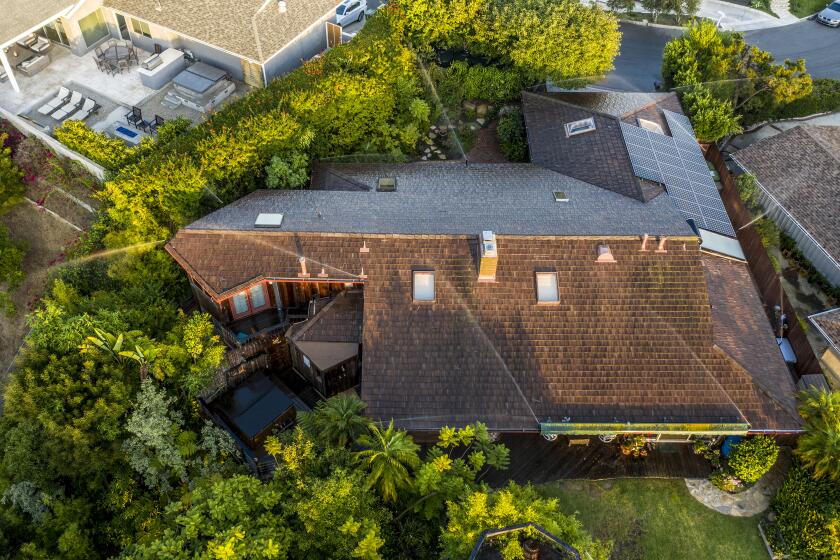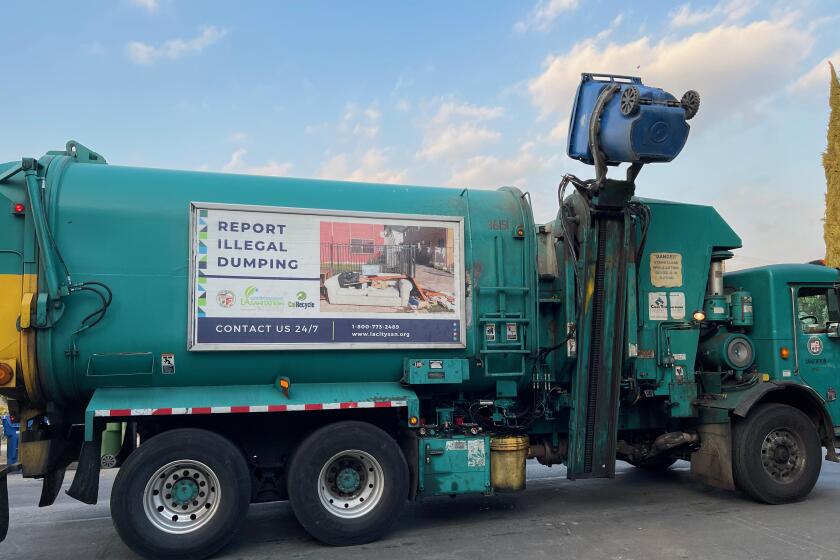Schiff’s first Senate bill proposes tax credit for hardening homes against fire, disasters

- Share via
- Schiff said the bill would help families making less than $300,000 per year protect themselves and their homes by helping them afford retrofits, while also encouraging insurers to cover more homes in vulnerable areas.
- Schiff is introducing the measure alongside fellow freshman Sen. Tim Sheehy (R-Mont.), a former U.S. Navy Seal and founder of the aerial firefighting company Bridger Aerospace.
For his first bill in the U.S. Senate, Adam Schiff (D-Calif.) has joined a Republican colleague to propose a federal tax credit for certain homeowners who retrofit and harden their homes against wildfires and other natural disasters.
Schiff is introducing the measure alongside fellow freshman Sen. Tim Sheehy (R-Mont.), a former U.S. Navy Seal and founder of the aerial firefighting company Bridger Aerospace.
Schiff said the bill would help families making less than $300,000 per year protect themselves and their homes by helping them afford retrofits, while also encouraging insurers to cover more homes in vulnerable areas, which have expanded due to climate change.
Insurance policies have become increasingly expensive and difficult to secure across California and in other states as the insurance industry has reassessed the growing threat and potential cost of major climate-driven disasters, such as the wildfires that destroyed parts of the Los Angeles region this year.
“The fires that we experienced were really unprecedented in their scope and devastation. And I wanted my first bill to be an effort to address them, but also to address the incredible risks of climate-related disasters around the state of California and around the country,” Schiff said in an interview with The Times.
Managing your property is one of the most important ways you can plan ahead for big fires.
Schiff said the bill — titled the Facilitating Increased Resilience, Environmental Weatherization And Lowered Liability, or FIREWALL, Act — is an effort to “help the victims of the L.A. fires rebuild and incorporate into their rebuilding different materials and technologies that will help us survive further natural disasters, but also [to] encourage and incentivize others around the state and country — whether they’ve been affected by fires or floods or other disasters — to try to harden their homes.”
Modular homebuilders are pouring into Los Angeles after January’s wildfires. Fire survivors love the promised speed and simplicity. But modular’s big promises have failed before.
The tax credit would cover up to half of the costs for qualified home upgrades, including for things such as new fire-resistant roofs, in states such as California and Montana, where the federal government has declared disasters in recent years, Schiff said.
The bill spells out qualified upgrades, including roof upgrades, water barriers, storm shelters and vegetation buffers, but those could be expanded over time, Schiff said.
The credit would be capped at $25,000 for families with an annual income of less than $200,000, with the cap indexed to inflation moving forward, he said. The cap would be incrementally reduced for families making more than $200,000 a year, with families becoming ineligible for the credit when their annual incomes reach $300,000.
Sheehy also praised the bill, saying in a statement that he has “witnessed firsthand the devastating aftermath of natural disasters on communities and families” as a former aerial firefighter.
“Given the unpredictability of a natural disaster, this bipartisan bill ensures that the American people receive the support they need to safeguard themselves against future disasters,” Sheehy said.
The fires that devastated Pacific Palisades and Altadena in January were among the most costly natural disasters in U.S. history, with a January estimate from weather forecasting service AccuWeather putting the total anticipated damage and economic loss between $250 billion and $275 billion. The fires also killed 30 people.
Many homeowners who lost their homes in the fires said insurers had dropped their policies last year, adding to the devastation.
California Gov. Gavin Newsom and Los Angeles Mayor Karen Bass have issued orders designed to make it easier for people to rebuild, and raised questions about how and whether homes should be rebuilt in fire-prone areas.
Schiff said he did not have an estimate for what the bill would cost the federal government, but said studies suggest that such measures save taxpayers money in the long run by reducing the overall cost of disaster recovery — in part because every hardened home helps protect those around it as well.
“What we saw during the L.A. fires is you would have embers that would travel a mile, go through a vent in someone’s home, ignite that home, that home would then ignite other homes in the same block, in the same neighborhood, and pretty soon the whole block was gone,” Schiff said. “If you can prevent that first house from being lit on fire, then you can sometimes save a whole neighborhood.”
Elaborate sprinkler systems could be a waste of money in protecting your home from wildfire. A better strategy, experts say, is to team up with neighbors to fireproof your entire community.
Schiff said he and Sheehy met during an orientation for new Senate members and “discovered we had a strong shared interest in wildfire suppression and remediation.” When he raised the idea of a tax credit, Sheehy mentioned a similar effort underway in Montana, and “it seemed like a very natural fit for the both of us,” Schiff said.
Schiff said the bill is a good starting point for what will need to be a much broader effort to shore up insurance markets in the face of climate change, which Republicans and the White House — dismissive of climate change in the past — need to start taking more seriously.
“Their attitudes are going to have to change, because their constituents are going to demand it, because their constituents aren’t going to be able to insure their homes and businesses,” Schiff said. “That’s already starting to happen.”
This year, the California Department of Forestry and Fire Protection expanded its “moderate,” “high” and “very high” wildfire hazard zones by nearly 6 million acres of land, or about 6% of the state, adding 2.8 million more Californians to the population that lives in such zones.
More to Read
Sign up for Essential California
The most important California stories and recommendations in your inbox every morning.
You may occasionally receive promotional content from the Los Angeles Times.














